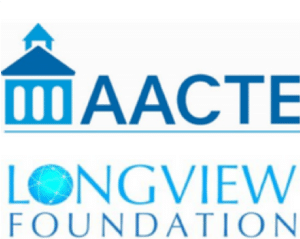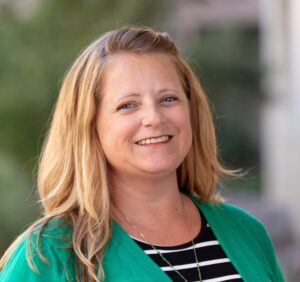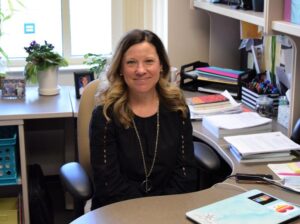09 May2023
By Taraneh M. Haghanikar
This blog article is part of the Global Education Faculty PLC Professional Development Series, sponsored by the Longview Foundation. The writing series aims to elevate the perspectives of international scholars — including teacher educators, graduate students, and alike — to offer insights into how Educator Preparation Programs (EPPs) can integrate intercultural understanding within their programs. AACTE members interested in participating in the series should contact AACTE’s Brooke Evans.
Incorporating diversity into the curriculum has never been more relevant or necessary.
Culturally competent teaching begins with acknowledging and embracing the considerable diversity students bring to the classroom and it builds on the culturally relevant literature utilized in teaching. However, teachers with minimum or no prior diversity experience are less likely to make informed decisions in their book selection. Failure to properly design inclusive lesson plans could create and maintain misunderstanding between teachers and students, further contributing to the cultural gap between them.
25 Apr2023
By Carolyn Phenicie
AACTE is a proud member of the National Teacher of the Year Selection Committee and applauds 2023 National Teacher of the Year Rebecka Peterson’s commitment to the profession and meeting the needs of all students.
The Council of Chief State School Officers (CCSSO) announced that Rebecka Peterson, a high school math teacher, is the 2023 National Teacher of the Year.
Peterson has taught high school math classes ranging from intermediate algebra to Advanced Placement calculus for 11 years at Union High School in Tulsa, Oklahoma. A proud immigrant of Swedish-Iranian descent, Peterson is passionate about making mathematics engaging, relevant and accessible to all students, no matter their background.
04 Apr2023
By Alice Ginsberg, Marybeth Gasman and Andrés Castro Samayoa
While the majority of U.S. K-12 students are children of color, only 20% of teachers are people of color — and 40% of the nation’s public schools do not have a single teacher of color on record. Despite a now decades old, nationwide effort to diversify the teaching profession, there is obviously still much work to be done. Minority Serving Institutions (MSIs) hold great promise towards the goal of bringing more teachers of color to the profession. They also provide teacher candidates opportunities to do their student teaching in schools and communities that are racially diverse. Of importance, these teacher candidates share a common interest in remaining in multicultural and high-needs schools after getting certified.
A related, but significantly less prominent issue, concerns the diversity of teacher educators. Across higher education, 75% of professors are White and teacher educators are over 76% White, demonstrating that many teacher candidates will not have a single professor of color as they make the transition through their teacher preparation programs. This challenge has huge ramifications for what happens in teacher education programs, including how candidates are recruited, how the curriculum is designed, and how urgently a program works to address critical issues of race and equity. Moreover, as Galman, Pica-Smith, and Rosenberger note: “It’s important that teacher educators have examined their own implicit biases before asking preservice teachers to engage with [them].”
04 Apr2023
By Brooke Evans
 Educators play a crucial role in how students are welcomed both into the classroom and within their communities — and understanding how to integrate international, intercultural, and global experiences and perspectives into the curriculum of teacher education is vital in a globally connected and diverse world.
Educators play a crucial role in how students are welcomed both into the classroom and within their communities — and understanding how to integrate international, intercultural, and global experiences and perspectives into the curriculum of teacher education is vital in a globally connected and diverse world.
As part of the first webinar in the Global Education Faculty PLC Professional Development Series, AACTE members are invited to join a panel of faculty experts and international scholars as they discuss educator prep program recruitment and support for international students on April 17. Save your spot and register today.
28 Mar2023
By Todd Finkelmeyer
This article was originally published by the University of Wisconsin–Madison School of Education.
As the nationwide teacher shortage continues to generate headlines, stress education leaders, and frustrate policymakers in search of answers, the UW–Madison School of Education is announcing the extension of an innovative program aimed at addressing the problem in Wisconsin.
 The UW–Madison School of Education Wisconsin Teacher Pledge program first started supporting students in the fall of 2020 and is dedicated to bolstering Wisconsin’s teacher workforce. This donor-funded initiative pays the equivalent of in-state tuition and fees, testing, and licensing costs for students enrolled in one of the School’s teacher preparation programs. In return, graduates “pledge” to teach for three or four years at a pre-kindergarten through 12th grade school in Wisconsin.
The UW–Madison School of Education Wisconsin Teacher Pledge program first started supporting students in the fall of 2020 and is dedicated to bolstering Wisconsin’s teacher workforce. This donor-funded initiative pays the equivalent of in-state tuition and fees, testing, and licensing costs for students enrolled in one of the School’s teacher preparation programs. In return, graduates “pledge” to teach for three or four years at a pre-kindergarten through 12th grade school in Wisconsin.
27 Mar2023
Marilyn Cochran-Smith and Gloria Ladson-Billings will share their perspectives on navigating K-12 education.
By Ruben Hidalgo
 Texas A&M University’s School of Education and Human Development (SEHD) will host a meeting of two renowned and respected minds in teacher education with a combined 90+ years of experience.
Texas A&M University’s School of Education and Human Development (SEHD) will host a meeting of two renowned and respected minds in teacher education with a combined 90+ years of experience.
Marilyn Cochran-Smith and Gloria Ladson-Billings, both National Academy of Education members, will share their perspectives on navigating K-12 education in a conversation moderated by SEHD professor Cheryl Craig.
27 Mar2023
By Kari Vogelgesang
Are you interested in advocating and bolstering social, emotional, behavioral, and mental health (SEBMH) content and practice in your teacher education program? As the director of professional development for the Scanlan Center for School Mental Health at the University of Iowa, I invite teacher education professionals to join AACTE’s newly-formed SEBMH Topical Action Group (TAG).
21 Mar2023
By Kaitlyn Brennan
This weekly Washington Update is intended to keep members informed on Capitol Hill activities impacting the educator preparation community. The views expressed in this post do not necessarily reflect the views of AACTE.
It was a busy week in Washington, and we are slated for another one ahead. This coming week, House Republicans are expected to begin consideration on the Parent Bill of Rights Legislation, H.R. 5. It is anticipated that discussions will begin on Thursday with the final vote slated for Friday. Members introduced several amendments to the bill last week — it remains to be seen if House Rules Committee will now allow floor votes on those amendments.
21 Mar2023
By Simon Wesson
 Young children who are taught by a teacher of the same ethnicity as themselves are developing better learning and problem-solving skills by the age of seven, new research suggests.
Young children who are taught by a teacher of the same ethnicity as themselves are developing better learning and problem-solving skills by the age of seven, new research suggests.
The effect was most pronounced in Black and Latinx children, the findings – looking at more than 18,000 pupils across the US – showed.
Published in the peer-reviewed journal Early Education and Development, the study revealed that if the ethnicity of children is shared with that of their teachers, the children are more likely to go on to develop better working memory. This is the ability to hold and process information in your mind – a skill which is essential for learning and problem solving.
21 Mar2023
By Brooke Evans
 AACTE is still accepting applications from all AACTE member faculty and Ph.D. students who are interested in joining the Longview-supported Global Education Faculty PLC.
AACTE is still accepting applications from all AACTE member faculty and Ph.D. students who are interested in joining the Longview-supported Global Education Faculty PLC.
The Global Education Faculty Professional Learning Community (PLC ) will provide a peer support network and professional development to faculty and Ph.D. students at comprehensive teacher preparation programs to effectively integrate global teaching competencies within their curriculum and practices.
20 Mar2023
A reflection on the Understanding the Landscape of Alternative Preparation session at #AACTE23
By Katey Arrington
 The current need for teachers is urgent. Enrollment and completion in university-based teacher preparation has been declining for more than a decade and production is not keeping pace with demand. Some states have turned to alternative teacher preparation to rapidly address the growing crisis but with mixed results. The Understanding the Landscape of Alternative Preparation session at ACTE 2023 brought together several leaders in the space of university-based alternative programs aiming to increase the speed and number of teachers prepared while maintaining the quality of the preparation provided.
The current need for teachers is urgent. Enrollment and completion in university-based teacher preparation has been declining for more than a decade and production is not keeping pace with demand. Some states have turned to alternative teacher preparation to rapidly address the growing crisis but with mixed results. The Understanding the Landscape of Alternative Preparation session at ACTE 2023 brought together several leaders in the space of university-based alternative programs aiming to increase the speed and number of teachers prepared while maintaining the quality of the preparation provided.
The panel included Jacqueline King, consultant for research, policy, and advocacy for AACTE; Suzanne Arnold, executive director of ASPIRE to Teach Alternative Licensure Program at the University of Colorado Denver; Tommy Hodges, dean and professor of mathematics education at the University of South Carolina; and Robert Lee, dean of the Sandford College of Education at National University. The panel was moderated by Stephanie Knight, dean of the Simmons School of Education and Human Development at Southern Methodist University.
14 Mar2023
By Michael Rose
AACTE expressed its support for President Biden’s fiscal year 2024 budget, which calls for strong investments in education that will help address the critical shortage of educators in our nation’s schools as well as help millions of students achieve their academic dreams.
The nation faces an unprecedented challenge hiring and retaining well-qualified and diverse educators to lead our classrooms. This shortage has been exacerbated by the pandemic, stagnant wages, and difficult work environments. The president’s budget proposal seeks to address many of these challenges. AACTE urges Congress to fund these priorities at the highest possible levels.
14 Mar2023
By Elizabeth Foster
The U.S. Department of Education is refreshing the National Educational Technology Plan. I am writing to extend this special invitation to participate in a group listening session. The group listening session for teacher education faculty and teacher preparation candidates only will take place on Thursday, March 16 from 1:00 –2:30 p.m. PDT/ 4:00-5:30 p.m. EDT.
To accept this invitation, please complete this confirmation form. Registration is required to participate.
14 Mar2023
By Kaitlyn Brennan
This weekly Washington Update is intended to keep members informed on Capitol Hill activities impacting the educator preparation community. The views expressed in this post do not necessarily reflect the views of AACTE.
On Thursday, the Biden-Harris Administration unveiled their FY2024 budget proposal. Under the request, the Department of Education would receive $90 billion in total discretionary funding — a $10.3 billion or 13.6% increase over the FY 2023 enacted level of funding provided for the Department of Education. In addition to the $90 billion in discretionary spending, the proposal also calls for new mandatory spending requests which include $600 billion over ten years for universal preschool and expanded support for childcare and $96 billion over ten years in new spending to double the maximum Pell grant by 2029, and $90 billion over ten years for a new free community college program. The budget request also includes $578 million in new funding to increase the number of counselors, school psychologists, and other health professionals in schools. This increase is spread among three programs: $428 million split between the School-Based Mental Services and Mental Health Services Professional Demonstration programs and $150 million within FIPSE for colleges to address student mental health needs.
13 Mar2023
By Kristi Evans
 Northern Michigan University education assistant professor Kristen White is among collaborators from 10 partner universities and K12s — including Marquette Area Public Schools — to receive an award from the National Association for Family, School and Community Engagement (NAFSCE) to participate in its Family Engagement Educator Preparation Innovation Project. Only nine collaboratives were selected from a nationwide pool of 76 proposals to receive grants totaling more than $150,000.
Northern Michigan University education assistant professor Kristen White is among collaborators from 10 partner universities and K12s — including Marquette Area Public Schools — to receive an award from the National Association for Family, School and Community Engagement (NAFSCE) to participate in its Family Engagement Educator Preparation Innovation Project. Only nine collaboratives were selected from a nationwide pool of 76 proposals to receive grants totaling more than $150,000.
The nine collaboratives will implement select components of the Educator Preparation Framework for Family and Community Partnerships, released by NAFSCE in December 2022, and engage in a learning community through June 2023. The grants will incubate new ideas, uncover how the framework sparks innovation to prepare educators for family and community engagement in diverse communities, and create a platform to share and disseminate ideas and knowledge.








 The
The  Texas A&M University’s School of Education and Human Development (SEHD) will host a meeting of two renowned and respected minds in teacher education with a combined 90+ years of experience.
Texas A&M University’s School of Education and Human Development (SEHD) will host a meeting of two renowned and respected minds in teacher education with a combined 90+ years of experience. Young children who are taught by a teacher of the same ethnicity as themselves are developing better learning and problem-solving skills by the age of seven, new research suggests.
Young children who are taught by a teacher of the same ethnicity as themselves are developing better learning and problem-solving skills by the age of seven, new research suggests. AACTE is still accepting applications from all AACTE member faculty and Ph.D. students who are interested in joining the Longview-supported Global Education Faculty PLC.
AACTE is still accepting applications from all AACTE member faculty and Ph.D. students who are interested in joining the Longview-supported Global Education Faculty PLC. The current need for teachers is urgent. Enrollment and completion in university-based teacher preparation has been declining for more than a decade and production is not keeping pace with demand. Some states have turned to alternative teacher preparation to rapidly address the growing crisis but with mixed results. The Understanding the Landscape of Alternative Preparation session at ACTE 2023 brought together several leaders in the space of university-based alternative programs aiming to increase the speed and number of teachers prepared while maintaining the quality of the preparation provided.
The current need for teachers is urgent. Enrollment and completion in university-based teacher preparation has been declining for more than a decade and production is not keeping pace with demand. Some states have turned to alternative teacher preparation to rapidly address the growing crisis but with mixed results. The Understanding the Landscape of Alternative Preparation session at ACTE 2023 brought together several leaders in the space of university-based alternative programs aiming to increase the speed and number of teachers prepared while maintaining the quality of the preparation provided. Northern Michigan University education assistant professor Kristen White is among collaborators from 10 partner universities and K12s — including Marquette Area Public Schools — to receive an award from the National Association for Family, School and Community Engagement (NAFSCE) to participate in its Family Engagement Educator Preparation Innovation Project. Only nine collaboratives were selected from a nationwide pool of 76 proposals to receive grants totaling more than $150,000.
Northern Michigan University education assistant professor Kristen White is among collaborators from 10 partner universities and K12s — including Marquette Area Public Schools — to receive an award from the National Association for Family, School and Community Engagement (NAFSCE) to participate in its Family Engagement Educator Preparation Innovation Project. Only nine collaboratives were selected from a nationwide pool of 76 proposals to receive grants totaling more than $150,000.